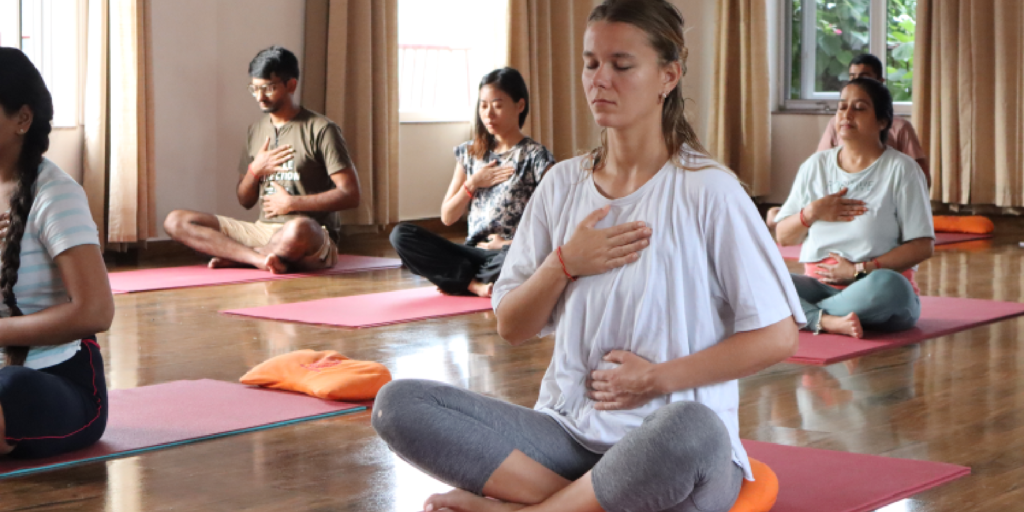Intrduction
Ajapa Japa is a technique that involves the repetition of a mantras typically performed with the aid of a rosary or mala. It is a form of japa, which is a practice found in Hinduism, Buddhism, and other spiritual traditions that involves the repetition of a mantra or sacred phrase as a form of devotion or contemplation. Here is the detailed explaination about What is Ajapa Japa, Its Benefits and the Challenges.
What is Ajapa is Japa?
Ajapa Japa is a meditation technique that involves the spontaneous repetition of a mantra or sacred syllable. This practice is believed to bring about a state of deep concentration and relaxation, and is often used as a means of cultivating spiritual awareness and connecting with the divine.
The word “ajapa” means “unrepeated,” while “japa” refers to the repetition of a mantra or sacred syllable. Together, these terms refer to the idea that the repetition of the mantra is not consciously controlled, but rather arises spontaneously from within the individual practicing the meditation.
There are several different ways to practice Ajapa Japa, but a common method is to sit in a comfortable position, close the eyes, and simply allow the mantra to arise spontaneously. The mantra may be repeated silently or aloud, and the repetition may be continuous or intermittent.
Some practitioners believe that the repetition of the mantra helps to quiet the mind and bring about a state of inner stillness and clarity. Others believe that the repetition of the mantra can help to cultivate spiritual awareness and connect the individual with the divine.
There are many different mantras that can be used in Japa meditation, and the choice of mantra may depend on the individual’s spiritual beliefs and personal preferences. Some common mantras used in this practice include “Om,” “Hare Krishna,” and “Aum Namah Shivaya.”
In addition to its use as a meditation technique, Ajapa Japa is also often used as a means of purifying the mind and cultivating positive qualities such as compassion, love, and wisdom. Many spiritual traditions view the repetition of the mantra as a way of aligning the individual with the divine and accessing higher states of consciousness. A Yoga Retreat in Rishikesh provides the ideal setting to explore Ajapa Japa, allowing participants to deepen their practice in a tranquil environment conducive to spiritual growth.

10 Benefits of Ajapa Japa
Promotes relaxation: The repetition of a mantra in Ajapa Japa meditation can help to calm the mind and bring about a state of relaxation.
- Reduces stress – By helping to quiet the mind and bring about a sense of inner calm, Ajapa Japa can be an effective way to reduce stress and anxiety.
- Increases focus and concentration – The repetition of a mantra can help to focus the mind and improve concentration.
- Cultivates spiritual awareness – Some practitioners believe that the repetition of a mantra in Ajapa Japa meditation can help to cultivate spiritual awareness and connect the individual with the divine.
- Increases self-awareness – By helping to quiet the mind and bring about a state of inner stillness, Ajapa Japa can help to increase self-awareness and facilitate personal growth.
- Improves sleep – The relaxation effects of Ajapa Japa meditation can help to improve sleep quality.
- Reduces negative emotions – The calming effects of Ajapa Japa meditation can help to reduce negative emotions such as anger, frustration, and fear.
- Increases positive emotions – The practice of Ajapa Japa can help to cultivate positive emotions such as love, compassion, and gratitude.
- Enhances physical well-being – Some practitioners believe that Ajapa Japa meditation can have a positive impact on physical health, including reducing blood pressure and improving heart health.
- Increases overall well-being – The relaxation and stress-reducing effects of Ajapa Japa meditation can contribute to overall well-being and a sense of balance and harmony in life.

8 Challenges of Ajapa Japa
- Difficulty sitting still – One challenge of Ajapa Japa meditation is that it requires sitting still for an extended period of time, which can be difficult for some people.
- Difficulty quieting the mind – It can be challenging to quiet the mind and focus on the repetition of the mantra, especially for those who are new to meditation or who have a lot of distracting thoughts.
- Difficulty choosing a mantra – Some people may struggle with choosing a mantra that resonates with them, which can make it difficult to engage in the practice fully.
- Difficulty maintaining consistency – It can be challenging to maintain a consistent practice of Ajapa Japa, especially for those who have busy schedules or are dealing with other distractions or commitments.
- Difficulty staying focused – It can be difficult to stay focused on the repetition of the mantra, especially for those who are new to meditation or who have a lot of distracting thoughts.
- Difficulty achieving results – Some people may struggle to see the benefits of Ajapa Japa meditation, which can be disheartening and lead to frustration.
- Difficulty finding a quiet place to practice – It can be challenging to find a quiet place to practice Ajapa Japa, especially for those who live in a busy or noisy environment.
- Difficulty with the physical discomfort of sitting in one position – For some people, sitting in one position for an extended period of time can be physically uncomfortable, which can be a challenge in Ajapa Japa meditation.
How Ajapa Japa can Benefit in Your Yoga Practice?
Ajapa Japa meditation can benefit your yoga practice in several ways:
- Increases focus and concentration – The repetition of a mantra in Japa meditation can help to focus the mind and improve concentration, which can be beneficial when practicing yoga.
- Promotes relaxation – The relaxation effects of Japa meditation can help to prepare the body and mind for yoga practice.
- Reduces stress – By helping to quiet the mind and bring about a sense of inner calm, Ajapa Japa can be an effective way to reduce stress and anxiety before starting a yoga practice.

- Increases self-awareness – By helping to quiet the mind and bring about a state of inner stillness, Ajapa can help to increase self-awareness and facilitate personal growth, which can be beneficial when practicing yoga.
- Cultivates positive emotions – The practice of Japa can help to cultivate positive emotions such as love, compassion, and gratitude, which can be beneficial when practicing yoga.
- Enhances physical well-being – Some practitioners believe that Japa meditation can have a positive impact on physical health, including reducing blood pressure and improving heart health. This can be beneficial when practicing yoga, as it can help to improve physical fitness and well-being.
- Increases overall well-being – he relaxation and stress-reducing effects of Ajapa Japa meditation can contribute to overall well-being and a sense of balance and harmony in life, which can be beneficial when practicing yoga.
Conclusion
Ajapa Japa is a meditation technique that involves the spontaneous repetition of a mantra or sacred syllable. This practice is believed to bring about a state of deep concentration and relaxation, often used to cultivate spiritual awareness and connect with the divine. A Meditation Retreat in Rishikesh offers the perfect space to explore and deepen your Ajapa Japa practice, enhancing your spiritual journey in a serene and supportive environment.
Ajapa Japa can be an effective way to reduce stress and increase focus, concentration, self-awareness, and positive emotions. It can also enhance physical well-being and contribute to overall well-being. While there can be challenges to practicing Ajapa Japa, such as difficulty sitting still or quieting the mind, with consistent practice, it can be a valuable tool for cultivating inner peace and spiritual growth.




